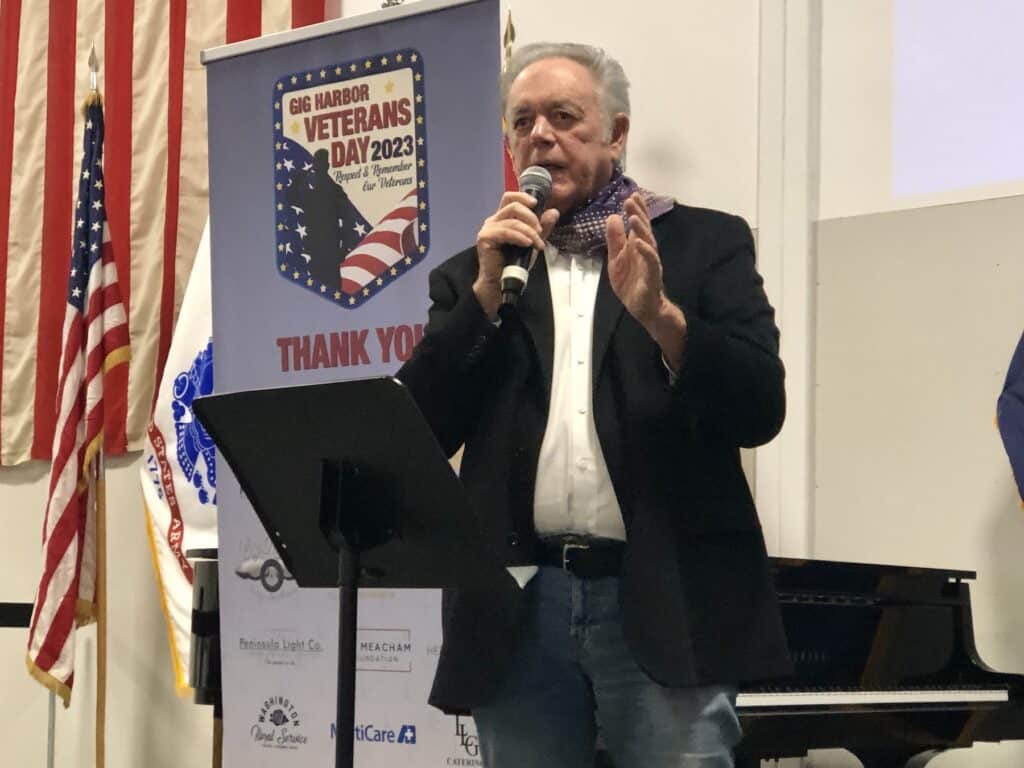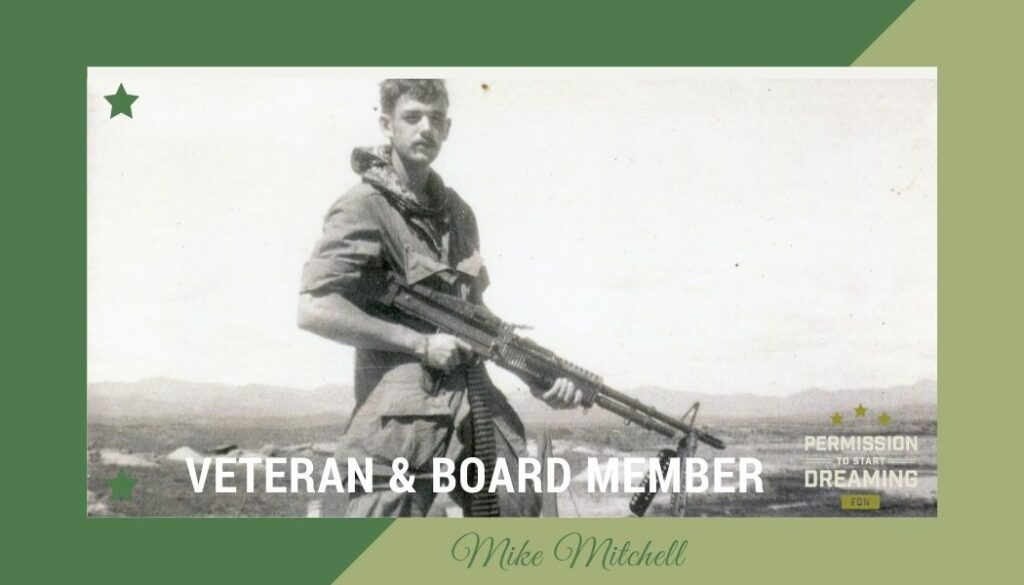Arts & Entertainment Community
Mike Mitchell’s personal Vietnam story debuting at Gig Harbor Film Festival
Mike Mitchell loves music — always has, always will. He worked for years booking, promoting, and putting on musical fundraising events, meeting several musicians who became near and dear to his heart. Mitchell was even part of a four-man band called The Blondes for a while.
Mitchell also associates certain music with particularly significant moments in his life — like the day in 1967 when he left an induction center in Seattle right after being drafted to fight in the Vietnam War.
“The day I left the induction center in Seattle, I had my transistor radio up to my ear, hoping to hear a Beatles song — and lo and behold, the disc jockey came on and said, ‘Now we’ve never done this before, but the Beatles have just released a brand-new album and we’re going to play it in its entirety,” Mitchell recalled. “It’s called Sgt. Pepper’s Lonely Hearts Club Band. … Music just meant everything to me.
A personal story
Mitchell’s love of music has endured for decades. It stayed with him through a war that fundamentally changed the course of his life and threaded itself into his work to help fellow veterans suffering from post-traumatic stress disorder (PTSD).
He even often starts meetings of the Heroes Huddle, a program for veterans suffering from PTSD he leads at Gig Harbor’s Permission to Start Dreaming Foundation, with music to show attendees that the space is safe and open. Mitchell is a foundation board member.
And this is why his love of music shows up, too, in his documentary film, Vietnam, One Man’s Story: 50 Years in the Making, which makes its world premiere at this year’s Gig Harbor Film Festival.

Mike Mitchell of Gig Harbor speaks during the 2023 Veterans Day observance.
The documentary is a professional recording of Mitchell’s 90-minute, one-man show about his wartime experience. He performed the piece at Tacoma’s Temple Theatre on Nov. 7, 2021. Had the COVID-19 pandemic not hit, forcing Mitchell to reschedule the performance, he would have performed it exactly exactly 50 years and 50 days since returning from Vietnam.
Helping fellow veterans
Mitchell did the show and created the professional recording for two reasons: “One, to help myself deal with PTSD, and number two was to let other veterans know that it’s OK to let it out instead of suppressing it.”
This is why he carries several thumb drives with copies of the film. He wants to get it into the hands of those who need it, particularly veterans and their loved ones. Mitchell wants to remind people that “if this guy can sit up in front of 400 or 500 people, and let his story be heard, so can anybody else.”
Mitchell’s decision took courage. He had never before spoken with his family about what he did and saw in Vietnam. He said his mother, in particular, would not have been able to handle it.
But when he sat up on that stage and started to speak, he broke that silence within his family.

The Gig Harbor-based Permission to Start Dreaming Foundation posted this photo of Mike Mitchell, a board member.
“It was a big release for me and an awakening for a lot of people after the show,” Mitchell recalled “[My family] knew that I was traumatized, and, I guess, just allowed me to have my privacy. … I was out with my other brothers in arms, out searching and destroying and trying to find the enemy on a daily basis. And it just ate me alive. I could never feel comfortable with myself.”
Physical fallout
Mitchell has suffered severe physical and emotional fallout from the war — not just the combat aspect, but from the effects of the herbicidal chemical warfare agent, Agent Orange.
The United States military used Agent Orange on broad swathes of Vietnam’s agricultural lands to debilitate and starve the Vietnamese, and wipe out any foliage that could be used for tactical coverage in Operation Ranch Hand.
The U.S. military sprayed Vietnam — and everyone there — with almost 11 million gallons of Agent Orange between 1965 and 1970, despite experiments on laboratory mice showing by the late 1960s that mice exhibited abnormalities and stillbirths following exposure to the chemical. There were also reports of birth defects in areas of Vietnam where the U.S. military sprayed the chemical.
Mitchell said that about a month before he came home, he suddenly started vomiting and passed out in the field. The doctors who treated him did not know what was wrong and decided to keep him there for 30 days — but he had less than 30 days left in the country. So, Mitchell found his way back to his unit, processed himself out, and went home.
But the vomiting didn’t stop, and it intertwined with his PTSD.
“I was just a mess. Just horrible. I couldn’t eat, I couldn’t sleep,” Mitchell recalled. “I was a nervous wreck. Jumped at the slightest sound. And it was just tough — tough, tough, tough, tough.”
The vomiting eventually went away for a spell, but then came back four or five years later. It was so bad that Mitchell’s stomach ruptured through the base of his esophagus. His stomach “was like an hourglass. Half of it was in my esophagus and the other half was where it belonged.”
Finally, Mitchell got surgery, which fixed the problem — and finally put weight back on his self-described “toothpick” frame.
“The doctor said, ‘You let me do this surgery, you will never throw up again … and you might gain a pound or two,’” Mitchell said. “He didn’t put a ‘4’ in front of the ‘2.’”
Mitchell was also diagnosed with prostate cancer, another effect of Agent Orange.
Facing PTSD
In the background of all his Agent Orange-induced physical health crises, PTSD lurked. It wasn’t until 1986 that Mitchell could access help through a Vietnam veteran-specific program offered through the Veterans Affairs’ (VA) vet centers. The VA only started offering this program, called the Readjustment Counseling Program, in 1980.
During the seven-month program, other veterans helped Mitchell start to work through his PTSD. The first two months, he said, focused on drug and alcohol abuse. The second two months focused on anger and violence.
“Well, I wasn’t violent, but boy was I angry,” Mitchell said. “So, there I was, four months sober, and dealt with the drugs and alcohol, dealt with the anger and violence.”
And then, he said, “it was time to let it out about Vietnam — and what a saving grace.”
“I had been suppressing it and holding it in for so long, sharing it with nobody, and all of a sudden, here I am in a room with 11 other guys that had all been to war,” Mitchell said. “And the guy that was leading the group was an amputee Marine. You couldn’t get any bullshit by him.”
But nobody wanted to talk first, Mitchell said. That’s when the Marine looked at him and said, “You got something to say?”
“I said, ‘Well, boy, do I,’” Mitchell recalled. “And I just unrolled it. I just talked and talked and talked for four or five sessions. And these sessions were at least two hours long. … I poured it out.”
By the time he finished the program, the only thing Mitchell wanted to do was to help other veterans who were suffering, too.
So he did.
Film Festival details
Vietnam, One Man’s Story: 50 Years in the Making will premiere on Friday, Sept. 26, at 9 a.m. and show again on Saturday, Sept. 27 at 1:30 p.m. at the Gig Harbor Film Festival. The festival runs from Sept. 25-28 at the Galaxy Theatres at Uptown Gig Harbor. There will also be an awards breakfast on Sept. 28. Readers can find a full program lineup here, and purchase tickets here.
Read more of our Film Festival coverage here and here.
